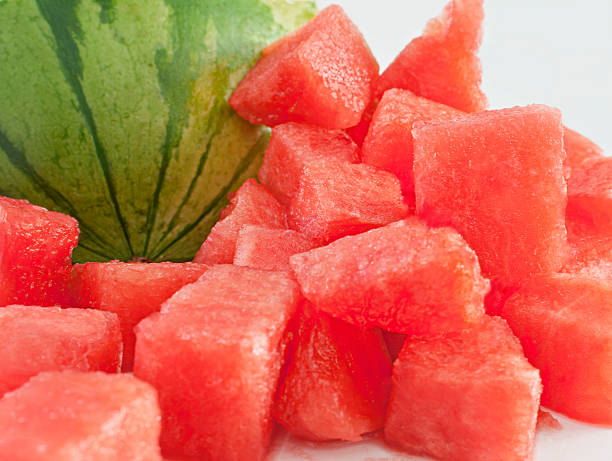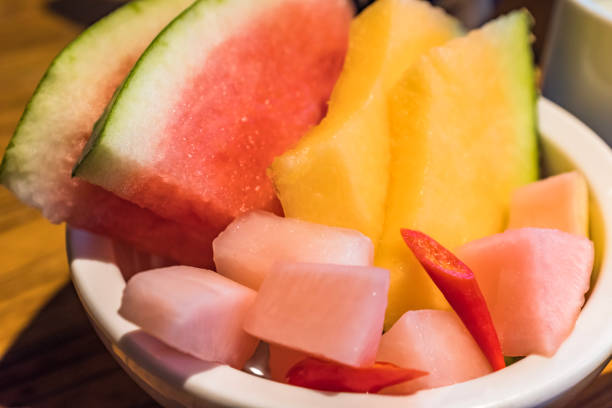Watermelon is a delicious and refreshing fruit that is enjoyed by many people around the world. It is a great source of hydration, especially during the hot summer months, and is also packed with nutrients that are essential for maintaining good health. One of the most important things to consider when it comes to watermelon is the number of calories it contains. In this article, we will take a closer look at how many calories are in watermelon chunks and what other nutritional benefits this fruit has to offer.
First, let’s talk about the calorie content of watermelon. A one-cup serving of diced watermelon contains approximately 46 calories. This is relatively low compared to other fruits, making it a great option for those who are trying to watch their calorie intake. Additionally, watermelon is low in fat and cholesterol, making it a heart-healthy option.
Watermelon is also a great source of vitamins and minerals. A one-cup serving of diced watermelon provides 21.6% of the daily value (DV) of vitamin C, 18.1% of the DV of vitamin A, and 2% of the DV of potassium. Vitamin C is important for maintaining a healthy immune system and also plays a role in the production of collagen, which is necessary for the health of the skin and other connective tissues. Vitamin A is important for maintaining good vision and maintaining healthy skin and mucous membranes. Potassium is an essential mineral that helps to regulate blood pressure and is also important for maintaining healthy muscle and nerve function.
In addition to its low calorie content, watermelon is also a good source of several essential nutrients. One cup of diced watermelon contains about 9% of the daily recommended intake of vitamin C, which is important for maintaining a healthy immune system. It also contains about 6% of the daily recommended intake of vitamin A, which is important for maintaining healthy vision and skin. Watermelon is also a good source of potassium, which is important for maintaining healthy blood pressure and heart function.
Watermelon is also a great source of hydration. As it is composed of 92% water, it can help keep you hydrated and refreshed during hot summer days. This is especially important when you are engaging in physical activity, as staying hydrated can help prevent fatigue and heat stroke.
It’s also important to note that watermelon is relatively low in sugar compared to other fruits. One cup of diced watermelon contains about 6 grams of sugar, which is less than half of the amount found in one cup of grapes. This makes watermelon a good choice for people who are trying to limit their sugar intake.
Watermelon is also a good source of antioxidants, which are substances that can help to protect the body against damage from harmful molecules called free radicals. One of the most important antioxidants found in watermelon is lycopene, which is a carotenoid that gives watermelon its characteristic red color. Lycopene has been shown to have a number of health benefits, including reducing the risk of certain types of cancer and helping to protect the skin against damage from the sun.
In addition to the vitamins and minerals mentioned above, watermelon is also a good source of other important nutrients such as amino acids, which are the building blocks of proteins. Watermelon is also a good source of antioxidants and contains other beneficial compounds such as citrulline and arginine, which can help to improve blood flow and reduce inflammation in the body.
In conclusion, watermelon chunks are a delicious and refreshing fruit that is also low in calories and high in essential nutrients. With only 46 calories per cup, watermelon is a great choice for people who are trying to lose weight or maintain a healthy weight. It is also a good source of hydration, vitamin C, vitamin A and potassium. Additionally, it is relatively low in sugar compared to other fruits. Watermelon can be enjoyed as a snack or added to salads, smoothies, or other dishes to add flavor and nutrition. Remember that while watermelon is a healthy choice, it’s always important to pay attention to portion control and pair it with a well-rounded diet.
It is important to note that even though watermelon is relatively low in calories and high in nutrients, it is still a source of natural sugar. As with any food, it is important to consume it in moderation and balance it with a healthy and varied diet.

 Home
Home Health
Health Diet & Nutrition
Diet & Nutrition Living Well
Living Well More
More












